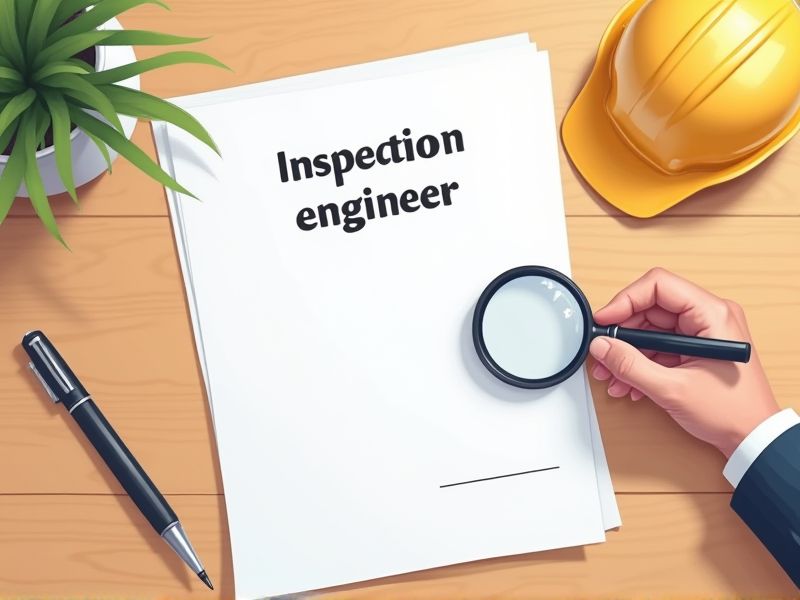
Inspection engineers play a critical role in ensuring safety and compliance across various industries. Certifications validate an engineer's expertise and demonstrate a standardized knowledge base crucial for assessing complex systems and structures. Acquiring specific certifications enhances credibility and can lead to better career opportunities and advancement. Essential certifications for inspection engineers include those recognized by industry standards and regulatory bodies.
ASNT Level II Certification (NDT)
Obtaining ASNT Level II Certification equips an inspection engineer with advanced knowledge in non-destructive testing techniques, which significantly enhances their ability to detect defects in materials and components. This certification is often required by employers to comply with industry standards and regulations, ensuring that the engineering assessments are reliable and accurate. Certified engineers can help reduce the risk of material failures by identifying issues early, thus saving costs associated with potential repairs or replacements. Holding an ASNT Level II Certification can also improve career prospects by signaling expertise and professional commitment in the field.
ASNT Level III Certification (NDT)
The ASNT Level III Certification is essential for an inspection engineer because it validates their advanced knowledge and skills in non-destructive testing methods, ensuring high standards of safety and quality. This certification enhances the engineer's ability to interpret complex testing results, leading to more accurate assessments of materials and structures. Having this certification increases credibility and trust with clients and employers, often resulting in better career opportunities and professional growth. It also sets a benchmark for maintaining industry standards and staying updated with the latest advancements in non-destructive testing technologies.
Certified Welding Inspector (CWI)
Certified Welding Inspectors ensure weld quality, reducing the risk of structural failures and costly repairs. Inspection engineers rely on CWI expertise to verify compliance with industry standards, enhancing project credibility. CWIs possess specialized training that aids in identifying potential welding issues early, preventing safety hazards. By integrating CWIs into inspection teams, companies enhance their reputation for quality and safety assurance.
API 510 Pressure Vessel Inspector Certification
API 510 Pressure Vessel Inspector Certification ensures an inspection engineer has comprehensive knowledge of inspection codes and standards, which enhances reliability in assessments. It validates the engineer's expertise in evaluating pressure vessels, reducing the likelihood of failures and accidents. Holding this certification can lead to better career opportunities and recognition within the industry. It assures employers and clients of the engineer's proficiency in ensuring safety and compliance with regulatory standards.
API 570 Piping Inspector Certification
The API 570 Piping Inspector Certification enhances an inspection engineer's credibility and demonstrates specialized knowledge in evaluating piping systems. Industries with stringent safety and maintenance standards often require this certification to ensure compliance and operational reliability. Certified inspectors are more adept at identifying potential issues and recommending effective solutions due to their advanced understanding of industry codes. Companies employing certified professionals can better mitigate risks, reducing the likelihood of costly failures or shutdowns.
API 653 Storage Tank Inspector Certification
API 653 Storage Tank Inspector Certification ensures standardized assessment protocols for safety and integrity of storage tanks. Engineers with this certification demonstrate a thorough understanding of regulatory compliance, which helps prevent environmental breaches and hazards. The certification validates their expertise in inspecting, repairing, and altering above-ground storage tanks. As a result, companies gain confidence in maintaining operational efficiency and prolonging the lifespan of their storage infrastructure.
ISO 9712 Non-Destructive Testing Certification
Obtaining the ISO 9712 Non-Destructive Testing Certification for an inspection engineer is crucial because it ensures that the engineer is equipped with standardized and internationally recognized testing skills. This certification verifies the engineer's capability to detect defects and inconsistencies in materials without causing any damage, enhancing the reliability of the inspections conducted. Employers and clients often prefer certified professionals since they are perceived as more competent and adhering to industry best practices. The certification also provides the engineer with a competitive edge in the job market, opening up more opportunities for career advancement.
NACE Coating Inspector Program (CIP)
The NACE Coating Inspector Program (CIP) standardizes the skills required for inspection engineers, which ensures uniformity and consistency in evaluating protective coating systems. Protective coatings are essential in preventing corrosion, and inadequacies in their application can lead to structural failures, causing significant economic losses. With the NACE CIP, inspection engineers gain advanced knowledge of coating materials and applications, reducing the risk of inspection errors. Organizations investing in this certification benefit from enhanced quality assurance and extend the lifespan of metallic infrastructures.
Certified Radiographic Interpreter (CRI)
Certified Radiographic Interpreters (CRIs) are crucial for inspection engineers because they possess specialized skills to accurately interpret radiographic images, thereby ensuring the integrity and safety of structures. Their expertise in identifying anomalies in materials helps in preventing potential failures or accidents. Inspection engineers rely on CRIs to validate and verify findings, which enhances the credibility of the inspection process. As regulations become more stringent, having a CRI on the team ensures compliance with industry standards and mitigates risks.
Project Management Professional (PMP)
Having a PMP certification can enhance an inspection engineer's ability to manage projects by providing standardized project management frameworks. This certification equips engineers with methodologies to efficiently allocate resources and meet deadlines. PMP training instills risk management skills, crucial for proactively identifying and mitigating potential project hazards. Organizations often prefer certified professionals, which can elevate an inspection engineer's career opportunities and professional credibility.
Summary
When you obtain certifications as an inspection engineer, your credibility significantly increases. This enhanced credibility often leads to better job opportunities and higher earning potential. Companies tend to trust certified professionals with more complex projects, which can further develop your expertise. Certified engineers also contribute to improved safety and quality standards, benefiting both the organization and society.
